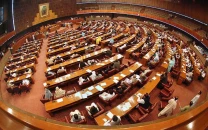PM calls for national agri-innovation plan and regulatory overhaul
Shehbaz Sharif urges coordinated strategy with provinces, stressing agri-modernisation to achieve self-sufficiency.

Prime Minister Shehbaz Sharif on Thursday directed the relevant authorities to formulate a sustainable, long-term policy for agro-industrial development to promote agriculture and forestry—key sectors in mitigating the impact of climate change, the Associated Press of Pakistan reported.
While chairing a meeting on agricultural sector reforms, the prime minister emphasised that the government is focused on modernising agriculture to achieve self-sufficiency. He instructed officials to devise a coordinated strategy in consultation with the provinces and all relevant stakeholders.
Highlighting the vast potential of Pakistan’s agricultural sector for rapid economic development, the prime minister noted that the country is endowed with fertile land, skilled agricultural experts, and hardworking farmers.
Read more: Low cotton, maize output a setback
He further directed that agricultural loans be provided to farmers on easy terms and stressed the importance of boosting agricultural research to enhance productivity.
Additionally, he also instructed the concerned departments to present a National Agri-Innovation Plan aimed at driving innovation across the sector.
The premier also called for the acceleration of ongoing reforms in the certification system for agricultural seeds and the formulation of a comprehensive action plan to promote the use of high-quality seeds.
Underscoring the government's commitment to modernising agriculture, he ordered the development of a robust regulatory framework to support innovation and technology adoption in the sector.
During the meeting, proposals were presented by the working group established for agricultural reforms. The meeting was attended by federal ministers Rana Tanveer Hussain, Ahad Khan Cheema, Muhammad Aurangzeb, and Musadik Malik, along with senior government officials.
This development comes as Pakistan's agriculture sector is facing significant challenges.
According to data from the Pakistan Bureau of Statistics (PBS) and Topline Research, the sector’s growth rate dropped to 1.1% in the second quarter of FY 2024–25, down from 6.1% in the same quarter of FY 2023–24.
The sharp decline has been largely attributed to a 31% fall in cotton production and a 15.4% drop in maize output, both of which are vital to the sector’s overall performance.
Read more: CM unveils plan to boost agriculture sector
Additionally, gram crop yields have seen a sharp downturn in the rain-fed Thal region, where prolonged drought and the effects of climate change have devastated hundreds of acres of farmland, pushing local farmers into financial distress.
Earlier this month, Sindh Chief Minister Murad Ali Shah directed the provincial agriculture department to develop a four-year package for small growers to strengthen the province’s agricultural system and support vulnerable farmers.





















COMMENTS
Comments are moderated and generally will be posted if they are on-topic and not abusive.
For more information, please see our Comments FAQ